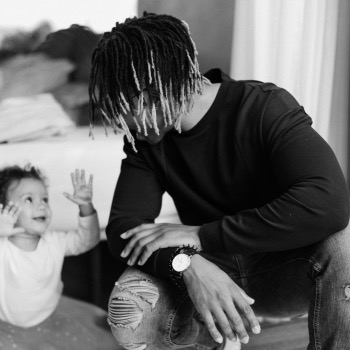What to do if you're a parent with COVID-19

Based on reports from around the world, children are less likely to get the virus, but that doesn’t mean parents won’t worry.
If you get COVID-19, public health experts recommend you isolate yourself.
If your child is old enough to take care of themselves, they’ll need to keep their distance while you get better. If you have a teen, teach them (from a distance), how to prepare their own meals and disinfect the house while you are sick and unable to care for them in the usual ways. It’s difficult, but is also an opportunity for them to grow.
If your child is younger, everyone in the house should wear a mask, wash hands a lot, and not share anything including: food, cups, towels, electronic devices, etc.
Other safe practices:
Isolate yourself. Use one room and one bathroom, and minimize contact as much as possible. If this is not possible, try to sleep in an area separate from others, and disinfect the bathroom each time after you use it.
Clean. Disinfect surfaces a lot. This includes tables, chairs, electronic devices, door handles, sink handles, etc. Anything that is touched should be disinfected as much as possible.
Make an Emergency Care Plan but do not include grandparents or other elderly individuals. Contact friends and families that you trust to look after your children in case you need to go to the hospital. Leave a list of these contacts visible in your house, for example on a wall by a phone, for emergency responders to see in the event that they need to be called and your children need to be given to a guardian. Identify a healthcare proxy, someone who can speak for you. Tell them what treatments you want and don’t want.
Note about Activities: One parent writes that while he was sick, he tried his best to keep his distance from his child by letting her do whatever activity kept her safe and entertained, and at a distance from himself, like painting, drawing, and running around in their yard. You may need to make exceptions with screen time and other activities in order to let your child be safe and happy while you physically distance yourself.
Wait 14 days: Monitor your temperature and symptoms and avoid contact with anyone else. In order to exit quarantine/isolation, you need to have no cough, no congestion, no fever, no muscle aches, no shortness of breath, no fatigue, no sore throat, no vomiting, and no diarrhea for 14 days. In other words, you should feel perfectly healthy for 14 days.
You are doing the best you can in a very difficult situation. Talking with and explaining to your children about what is happening is the best way to ease anxiety and reassure them that this change is not permanent, but necessary for right now. Check out our other blogs in this parent series for more resources and suggestions.
Disclaimer
This articles provide general information for educational purposes only. The information provided in this article, or through linkages to other sites, is not a substitute for medical or professional care, and you should not use the information in place of a visit, call consultation or the advice of your physician or other healthcare provider.